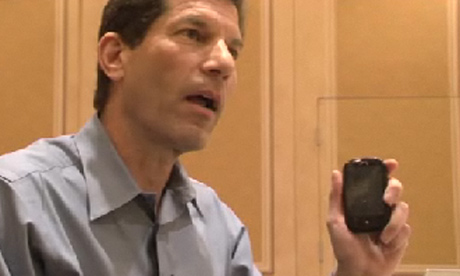
RIM, as pretty much everyone - including RIM's management - knows, is in serious trouble. Analysts have cut their targets for its stock price to just $5, which given that it presently has total cash and equivalents of $4 per share, means that they see little prospect of improvement; Nomura even said that it could run out of cash. It has made losses for the past two quarters, and there's no sign of that changing suddenly.
This all sounds like a business headed for hell in a handbasket, or a breakup, or simple sale. But RIM could survive on its own terms, and even become a challenger again.
It won't be easy, but all it needs to do is to take a lesson from the company that blindsided it in the smartphone market - Apple.
In September 1996, Apple had just lost $1.2bn for its financial year (which with inflation is equivalent to $1.76bn today).
It was, as Steve Jobs said, about 90 days from bankruptcy. It had been promising a next-generation operating system, but had repeatedly canned it and/or put it back. (It had just acquired NeXT Computer, with Jobs at its head, in order to acquire that next-generation operating system; NeXT had won a face-off with Jean-Louis Gassée's BeOS.) It had too many staff. It had too many products. People weren't interested. They were so convinced it was going to die that they were abandoning it for the only real rival.
So really RIM today is not too different from Apple then; except that RIM isn't anything like as near to death as Apple was. So how can RIM thrive?
The following will be uncomfortable reading to some in RIM - because it will cost them their jobs - but Apple's example shows that there's a way forward.
Slim down the number of products into a comprehensible set
Four will do. I've long since given up trying to figure out the difference between a BlackBerry Bold. Curve, 9800, 9700 and the rest. Seriously, is there any?
This US smartphone listing for RIM shows 22 products. That's absurd. How can anyone choose between them? That's worse than Apple's 1996 menagerie of 15 different computers - Quadra, Power Macintosh, and so on, each demanding its own products. When you're in trouble, reduce the complexity, because that cuts out production and stock costs too. Jobs cut a swathe through the bloated product range, reducing it to four.
Don't think about selling
Trying to think of selling the business, and maximising the individual value of each bit, distracts from actually running the business for the future. You'll have more of a going concern (if things come to that) by building a strong business. Apple was nearly sold to Sun, and to IBM, in its darkest days; if that had happened, it would now be a footnote in history.
Thinking about sales is what bankers do, and there's a team of them crawling over RIM at the moment. Ignore them and get on with the work.
Partition your market to give yourself clarity
Steve Jobs created a quadrant: consumers and professionals on one side, laptops and desktops on the other. (This was long before iPods, iPads or iPhones.) Consumer looking for a laptop? Here you go - iBook. Professional after a desktop? Power Mac for you. Simpler to make, simpler to choose. RIM needs that same clarity. It could almost split its market into two - consumer and enterprise. High-end and low-end. Four phones. Sorted.
Dump products that aren't working
Simple, really. Jobs killed the Newton. Time for RIM to kill the PlayBook, which has shipped a grand total of 1.1m in a full year while costing it billions in production, writeoffs and distraction. And of course kill at least 18 of those damn phones.
Hire a visionary, inspiring chief executive
This is bad news for Heins, but the brutal truth is that you don't lead a company out of the valley of death by doing the meat-and-potatoes work (to mix metaphors). Jobs was exactly the right person for Apple: he was committed to its survival and he'd learnt his errors and weaknesses through his failures at NeXT Computer and successes at Pixar. (His hiring of Tim Cook, an exemplary supply chain controller, in 1997 was indicative of that recognition.)
So who's the right person for RIM? Often, founders can revive a company; besides Jobs, there was Michael Dell returning to Dell in 2008, when he saw the business he created in trouble. (That hasn't been enthralling, but Dell was in less trouble.)
However in this case the two founders are Jim Balsillie and Mike Lazaridis, who were only ejected in January. Neither is the right one to run the company out of the pit, because they got it there in the first place, although Lazaridis is a brilliant inventor.
I'd suggest there's an obvious candidate: Jon Rubinstein, ex-Apple hardware chief, ex-Palm chief, ex-head of HP's tablet effort. He was drafted into Palm in June 2009 after things began going seriously wrong, and got it organised enough to release the WebOS software and Palm Pre products. That wasn't enough to dig Palm out of its troubles (and "Ruby" seems to have hated life inside the byzantine bureaucracy of HP) but there's no doubt that he has the management skills to turn RIM around. Unfortunately for Heins, in this situation he gets to be the Gil Amelio - the incumbent CEO who gets pushed out by the cuckoo, and can take none of the credit for any subsequent success.
Cut jobs
Sorry, but this has to happen to get costs down. Start with the people who are doing all the marketing stuff for those 22 different phones and work outwards.
Give up the idea of BlackBerry 10 as a smartphone platform
Also: drop the idea of trying to sell pricey BB10 handsets in 2013. This sounds bizarre, doesn't it? Aren't we constantly hearing that BB10 is RIM's last great hope? But nobody can see the point in trying to sell BB10 on handsets. Heins has showed off touchscreen versions. Be honest. Those won't persuade people to ignore iPhones or Android phones (or Nokia phones). They'll vanish into the abyss.
Mobile carriers like selling RIM's phones because they make better profits on them than they do on iPhones or top-end Android handsets. There's a burgeoning and eager group of buyers in the developing world who like the BlackBerry keyboard. There are also lots of corporate users who like the keyboard. Keep them happy; play for time. (You could improve your browser, but stick with the basics in the meantime.)
Stop developing the great-thing-before-the-last-one, and develop the next great thing
You're never going to beat Chinese handset makers at churning out cheap handsets; you're never going to beat Apple or Samsung at the top end. Don't pick fights you can't win.
Instead, do what Apple did to you: develop something that leapfrogs the competition. Go past smartphones to the next thing that we're going to do in connectivity. RIM did it before, leapfrogging featurephones to offer phones with data and email (and web browsing of sorts) built in. Now it needs to do it again.
And what is next? Wearable computing - the sort of thing being demonstrated by Google with its Glass project. You shouldn't need to take your smartphone out of your pocket to see what messages and so on you have, nor should you need to press buttons to make things happen. A really "smart" smartphone will do all this and connect to things on your body - less an object, more a network of objects you use.
Does that sound bizarre and futuristic? No more so than the idea of people carrying around little pocket computers and using them to find their way around unfamiliar places would have 15 or so years ago. Wearables are much closer than that - and so perhaps close enough for RIM to develop something before the next wave sweeps over it.
In fact, QNX is rather a good choice for a wearable computing system, as Jean-Louis Gassée points out:
QNX software is the preferred choice for life-critical systems such as air traffic control systems, surgical equipment, and nuclear power plants. And its cool multimedia features have QNX software turning up in everything from in-dash radios and infotainment systems to the latest casino gaming terminals.
That sounds rather cool for wristwatches that tell you emails and calls, or glasses that show you maps. QNX could be the great secret asset - rather as NeXTStep, the NexT OS, eventually was for Apple; it forms the core of iOS, which is earning all those billions.
Conclusion
It's pretty simple: RIM has to simplify its product line, cut its workforce, hire a visionary and build the next great thing. How long should that take? Well, for Apple the gap between Jobs reappearing on the scene and the launch of the iPod, its first breakaway product, was five years. Rubinstein (let's assume he comes out of retirement to take the job) might not have that long - but if RIM can stop burning cash on lost causes like the PlayBook, focus its spending on a few products, keep a core audience (teenagers and businesses and carriers) then it can come through this.
Well, here's hoping.







